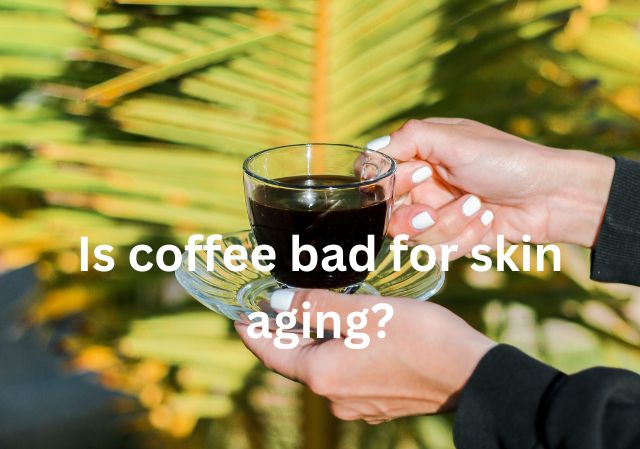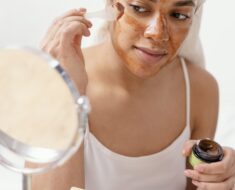Coffee is a popular beverage consumed worldwide, with an estimated 2.25 billion cups of coffee consumed every day.
While most people drink coffee for the energy boost it provides, some may wonder if it has negative effects on the skin, particularly when it comes to skin aging.
Coffee is a brewed drink made from roasted coffee beans, and it contains caffeine, antioxidants, and other beneficial compounds.
Many studies have suggested that coffee can have numerous health benefits, including reduced risk of type 2 diabetes, liver disease, and some types of cancer.

When it comes to the skin, caffeine and other compounds in coffee have been shown to have both positive and negative effects.
In this article, we will explore the science behind skin aging, the effects of coffee on the skin, and how to reduce the negative effects of coffee on the skin.
The Science Behind Skin Aging
Aging is a natural process that affects all parts of the body, including the skin. There are two types of skin aging: intrinsic and extrinsic. Intrinsic aging is a natural process that occurs as we age and is influenced by genetics.
Extrinsic aging, on the other hand, is caused by external factors such as UV radiation, pollution, and lifestyle choices such as smoking and diet.
Here you can see are coffee ground good for skin.
How Coffee Affects the Skin
Coffee contains caffeine, which is a stimulant that can have both positive and negative effects on the skin.
Caffeine is a vasoconstrictor, which means it can reduce the appearance of redness and puffiness in the skin.
However, caffeine can also dehydrate the skin, which can lead to dryness and premature aging.
Is coffee bad for skin aging?
Coffee can have both positive and negative effects on skin aging. On the positive side, coffee is rich in antioxidants that can help protect your skin from damage caused by free radicals, which can accelerate the aging process.
Additionally, caffeine can help reduce inflammation and improve circulation, which can promote healthy skin.
Thus, coffee doesn’t seem bad for skin aging.
However, excessive coffee consumption can also have negative effects on skin aging.
Coffee is a diuretic, which means it can dehydrate your skin and make it look dull and tired. Dehydration can also exacerbate fine lines and wrinkles, making them more noticeable.
In addition, drinking too much coffee can disrupt your sleep, which can lead to dark circles and puffy eyes. Lack of sleep can also increase stress levels, which can cause your skin to look tired and aged.
Overall, moderate coffee consumption is unlikely to have a significant impact on skin aging, and may even have some benefits.
However, excessive coffee intake can dehydrate your skin and have negative effects on your overall health, which can contribute to premature aging.
The Benefits of Coffee for the Skin
Despite its potential negative effects, coffee also contains compounds that can benefit the skin.
For example, coffee is rich in antioxidants, which can help protect the skin from free radical damage. Free radicals are unstable molecules that can damage cells and contribute to aging and disease.

In addition, coffee has anti-inflammatory properties that can help reduce redness and irritation in the skin. Some studies have even suggested that caffeine can help reduce the appearance of cellulite.
Negative Effects of Coffee on Skin
While coffee has many potential benefits for the skin, it can also have negative effects. One of the most significant negative effects of coffee on the skin is dehydration.
Caffeine is a diuretic, which means it can increase urine production and cause dehydration. Dehydration can lead to dryness, flakiness, and premature aging.
In addition, coffee can stimulate the production of stress hormones such as cortisol, which can contribute to the breakdown of collagen and elastin in the skin.
Collagen and elastin are proteins that give the skin its elasticity and firmness. When these proteins break down, the skin can become loose and wrinkled.
How to Reduce the Negative Effects of Coffee on Skin
While coffee is a beloved beverage for many people, it can have negative effects on your skin. Here are some tips on how to reduce the negative effects of coffee on your skin:
- Limit your coffee intake: Consuming too much coffee can lead to dehydration, which can make your skin look dull and tired. Try to limit your coffee intake to 1-2 cups per day.
- Drink plenty of water: Drinking plenty of water can help counteract the dehydrating effects of coffee. Aim for at least 8 glasses of water per day to keep your skin hydrated and healthy.
- Use a moisturizer: Applying a moisturizer after washing your face can help lock in moisture and prevent dryness and irritation caused by coffee.
- Use a gentle cleanser: Coffee can be abrasive and cause micro-tears on the skin’s surface. Using a gentle cleanser can help prevent further damage and irritation.
- Wear sunscreen: Coffee contains antioxidants that can help protect your skin from damage, but it’s not a substitute for sunscreen. Wearing sunscreen daily can help prevent premature aging and other skin damage caused by UV rays.
By following these tips, you can enjoy your coffee without worrying about its negative effects on your skin.
Now let’s some related faq’s.
Related faq’s
Will quitting coffee improve my skin?
- Quitting coffee may improve your skin in some ways, but it depends on the individual and their specific skin concerns. Here are some potential benefits of quitting coffee for your skin:
- Improved hydration: Coffee is a diuretic, which means it can dehydrate your skin. Quitting coffee can help improve hydration levels, which can make your skin look plumper, smoother, and more radiant.
- Reduced inflammation: Coffee contains caffeine, which can increase inflammation in some people. Quitting coffee can help reduce inflammation, which can help calm irritated skin and reduce redness.
- Better sleep: Drinking coffee can disrupt your sleep, which can lead to dark circles, puffy eyes, and tired-looking skin. Quitting coffee can help improve your sleep quality, which can lead to a more rested and refreshed appearance.
- Reduced risk of breakouts: Coffee can increase cortisol levels, which can lead to acne breakouts in some people. Quitting coffee can help reduce cortisol levels, which can lower the risk of breakouts.
However, it’s important to note that quitting coffee is not a magic solution for all skin concerns.
Other factors such as genetics, lifestyle habits, and skincare routine also play a role in the health and appearance of your skin.
If you are considering quitting coffee to improve your skin, it’s important to consult with a healthcare professional or dermatologist to determine the best course of action for your individual needs.
Is drinking coffee bad or good for skin?
Drinking coffee can have both positive and negative effects on the skin, depending on various factors. Here are some potential benefits and drawbacks of coffee for the skin:
Benefits of coffee for the skin:
- Antioxidant properties: Coffee contains antioxidants that can help protect the skin from damage caused by free radicals. This can help reduce the signs of aging and improve overall skin health.
- Increased circulation: The caffeine in coffee can help increase blood flow and improve circulation, which can promote healthy skin.
- Anti-inflammatory effects: Some studies suggest that coffee may have anti-inflammatory effects, which can help soothe and calm irritated skin.
Drawbacks of coffee for the skin:
- Dehydration: Coffee is a diuretic, which means it can dehydrate the skin and lead to dryness, flakiness, and a dull complexion.
- Increased cortisol levels: Drinking coffee can increase cortisol levels, which can lead to skin inflammation and acne breakouts in some people.
- Staining: Coffee can stain the teeth and skin, which can be difficult to remove and may lead to discoloration.
Overall, moderate coffee consumption is unlikely to have a significant negative impact on the skin, and may even have some benefits.
However, excessive coffee intake can lead to dehydration and increased cortisol levels, which can contribute to skin problems.
It’s important to maintain a balanced diet and lifestyle, stay hydrated, and use appropriate skincare products to maintain healthy and glowing skin.
Does coffee reduce skin glow?
Drinking excessive amounts of coffee can lead to dehydration, which can reduce skin glow.
Coffee is a diuretic, which means it can cause increased urine production and lead to water loss in the body. When your body loses too much water, your skin can become dry, dull, and lacking in radiance.
Additionally, excessive coffee intake can disrupt sleep, which can also contribute to a tired and lackluster complexion. Poor sleep quality can lead to dark circles, puffiness, and a sallow complexion, which can further reduce skin glow.
However, moderate coffee consumption is unlikely to have a significant negative impact on skin glow.
In fact, coffee contains antioxidants and anti-inflammatory properties that can help protect the skin from damage and promote a healthy, glowing complexion.
It’s important to maintain a balanced diet and lifestyle, stay hydrated, and use appropriate skincare products to help maintain healthy and radiant skin.
What happens to skin when you drink coffee?
When you drink coffee, the caffeine and other compounds in coffee can have various effects on the skin:
- Dehydration: Coffee is a diuretic, which means it can cause increased urine production and lead to dehydration. This can cause the skin to become dry, dull, and lacking in radiance.
- Increased cortisol levels: Drinking coffee can increase cortisol levels, which is a stress hormone that can lead to inflammation in the body. Inflammation can cause skin problems such as acne, rosacea, and premature aging.
- Improved circulation: The caffeine in coffee can help increase blood flow and improve circulation, which can promote healthy skin and a radiant complexion.
- Antioxidant properties: Coffee contains antioxidants that can help protect the skin from damage caused by free radicals. This can help reduce the signs of aging and improve overall skin health.
- Staining: Coffee can stain the skin, especially if consumed in large quantities or spilled. This can cause discoloration and may be difficult to remove.
Overall, the effects of coffee on the skin depend on various factors such as the amount consumed, individual sensitivity, and overall health and lifestyle habits.
Moderate coffee consumption is unlikely to have a significant negative impact on the skin, but excessive intake can contribute to dehydration, inflammation, and skin problems.
It’s important to maintain a balanced diet and lifestyle, stay hydrated, and use appropriate skincare products to help maintain healthy and radiant skin.
Conclusion:
In conclusion, while coffee does have some potential negative effects on skin aging, such as dehydration and increased cortisol levels, it is not necessarily a guarantee that coffee will accelerate the aging process.
In fact, the antioxidants and anti-inflammatory compounds found in coffee may even have some protective effects on the skin.
However, as with any food or beverage, moderation is key.
It is recommended that you limit your coffee consumption to no more than three cups per day and make sure to stay hydrated with plenty of water and moisturizing skincare products.
So, is coffee bad for skin aging? The answer is not a simple yes or no.
It ultimately depends on how much you consume and how well you take care of your skin.
If you enjoy coffee, there’s no need to give it up completely. Just remember to drink it in moderation and maintain a healthy skincare routine.






